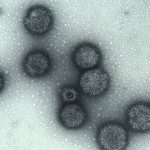Link to Pubmed [PMID] – 24086343
PLoS ONE 2013;8(9):e74423
Recent isolation of the non-K1 Escherichia coli neonatal meningitis strain S286, belonging to phylogroup C, which is closely related to major group B1, and producing an extended-spectrum beta-lactamase, encouraged us to seek the genetic determinants responsible for its virulence. We show that S286 belongs to the sequence O type ST23O78 and harbors 4 large plasmids. The largest one, pS286colV (~120 kb), not related to resistance, contains genes characteristic of a Conserved Virulence Plasmidic (CVP) region initially identified in B2 extra-intestinal avian pathogenic E. coli (APEC) strains and in the B2 neonatal meningitis E. coli strain S88. The sequence of this CVP region has a strong homology (98%) with that of the recently sequenced plasmid pChi7122-1 of the O78 APEC strain Chi7122. A CVP plasmid-cured variant of S286 was less virulent than the wild type strain in a neonatal rat sepsis model with a significant lower level of bacteremia at 24 h (4.1 ± 1.41 versus 2.60 ± 0.16 log CFU/ml, p = 0.001) and mortality. However, the mortality in the model of adult mice was comparable between wild type and variant indicating that pS286colV is not sufficient by itself to fully explain the virulence of S286. Gene expression analysis of pS286colV in iron depleted environment was very close to that of pS88, suggesting that genes of CVP region may be expressed similarly in two very different genetic backgrounds (group C versus group B2). Screening a collection of 178 human A/B1 extraintestinal pathogenic E. coli (ExPEC) strains revealed that the CVP region is highly prevalent (23%) and MLST analysis indicated that these CVP positive strains belong to several clusters and mostly to phylogroup C. The virulence of S286 is explained in part by the presence of CVP region and this region has spread in different clusters of human A/B1 ExPEC, especially in group C.
